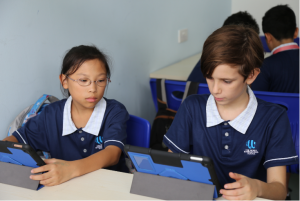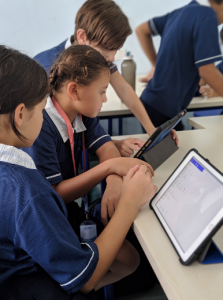As the world becomes increasingly connected and reliant on the internet, children are spending more time surfing the web for school and leisure purposes.
The internet does serve as a learning resource, but it can also pose safety risks and dangers to growing children, especially those who haven’t been instructed on how to use it defensively.
As the parent of a school-aged child, you’re the first line of defence against those who threaten the safety of your children through virtual means.
As a result, not only must you be vigilant, but you must teach your children to be vigilant, as well.
By instructing students how to use the internet properly, what information to share and not share, and who to share it with, you can help keep your children just a bit safer as they interact digitally with the world.
You play a crucial role in guiding and monitoring children’s internet usage habits.
In addition to enabling parental controls, implement these four expert-recommended online safety tips to help keep your pre-teens out of trouble when they’re logged in online.

Teach Children to Keep Their Information Secure
One of the most important online child safety tips protects a child’s online information.
- Create hard-to-crack passwords from memorable phrases, and include mixed-case letters, symbols and numbers.
- Change passwords frequently.
- Exercise password hygiene with unique passwords for each website or app.
- Use a password manager to protect login information.
- Never share passwords with friends.
- Never log in to sensitive websites, such as banks, over public Wi-Fi.
- Set firm guidelines regarding which online activities require your permissions
Instruct Children to Be Careful What Information They Share
Online safety includes recognising the reality of your child’s digital footprint.
- Implement family rules and expectations about the responsible sharing of photos, private information and other life details.
- Remind children not to share their full name, address, phone number, birthday, school details or plans.
- Minimise social comparison since most people only share highlights rather than boring, embarrassing or sad life moments.
- Make sure your child’s social media accounts have privacy settings on and they are not sharing information publicly.
- Disable your child’s webcam, or place tight restrictions on video chat.
- Instruct children never to set up face-to-face meetings with people who found them online.
- Prohibit children from sharing ID card, credit card or any bank details online.
Help Your Children Recognise Fake Accounts and User

In addition to verifying that the URL matches the site name, help children learn to recognise fake online transactions.
- Explain impersonation and the importance of protecting passwords and private data.
- Learn to recognise scams that may be sophisticated enough to trick even savvy adults.
- Spot phishing attempts in email and messages.
- Instruct children never to click links in unfamiliar emails.
- Show children how to recognise and delete spam messages.
- Emphasise the fact that if it sounds too good to be true, it’s fake.
Teach Your Children to Be Kind Online

Digital citizenship features kindness and promotes digital safety for children.
- Encourage children to treat people online as if they were face-to-face.
- Talk about tone of voice and word meaning, two important conversation pieces that can be misinterpreted online.
- Reinforce school values, such as anti-bullying and responsible technology device usage.
- Emphasise the importance of telling an adult when they witness online bullying or injustice.
- Explain “mob mentality” and encourage your children to think independently.
How One World International School Implements Online Safety for Children

Digital safety for children includes their home and school internet usage. International schools in Singapore like One World International School (OWIS) provide a technology-driven environment that prepares students to keep pace with the latest developments in the digital age.
They integrate technology into their curriculum and learning approach, allowing students to develop their technology skills for the future.
Schools like OWIS also advise their students to be digitally safe and savvy through digital literacy classes.
Their students sign a “digital citizenship agreement”, which outlines their responsibilities and the safety and security measures they must adopt while using technology devices.
They also have an anti-bullying policy that includes cyberbullying.
Schools and parents equally have a responsibility towards protecting children in this digital age.
While children today may be digital natives, they are also more vulnerable to online security threats as they are exposed to far more applications and technology than ever before.
By educating children on digital safety and ensuring that they are aware of and follow the recommended safety guidelines and tips, we can be sure that our children will be digitally-savvy and responsible citizens.
For related articles, please see the links below:
Singapore Parents: Should You Let Your Kids Use the Internet?
